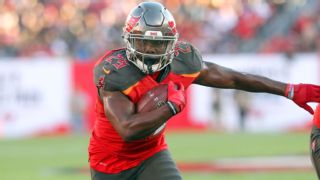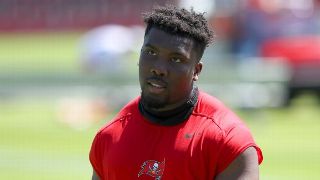|
TAMPA, Fla. -- The words in Tampa Bay Buccaneers running back Peyton Barber's playbook are sometimes jumbled, and they don’t make sense, so he has to read them over and over. He has to draw the plays up, too, and then he has to walk through them to fully understand. "Some people can get things with classroom only, but he’s certainly gotta be in it, see it and let it happen," said Bucs running backs coach Tim Spencer, who has worked with Barber the past two seasons. Barber has dyslexia, a learning disorder that affects 10 to 15 percent of the U.S. population. It results in difficulty with word recognition, spelling, reading comprehension, language and visual processing. "I do read a lot slower, and there will be times when I’m reading something and I’ll read it backwards or the words will come off the page," said Barber, 23. "[But] I don't really see it as a challenge, to be honest."  Barber also has attention deficit-hyperactivity disorder (ADHD), a condition characterized by difficulty concentrating, hyperactivity and impulsivity. Barber also has attention deficit-hyperactivity disorder (ADHD), a condition characterized by difficulty concentrating, hyperactivity and impulsivity.
Neither has held him back on the football field, even when he must learn hundreds of plays and identify where the pressure is coming from in a matter of seconds. In fact, despite starting only four games last season, Barber finished with a team-high 423 rushing yards, 114 receiving yards and three touchdowns, becoming a candidate for the starting role in 2018. “I think he will be right there,” Bucs coach Dirk Koetter said at the end of the season. “I think that will definitely be a consideration. Peyton did a good job with his opportunities this year.” 'I learned a lot slower'Growing up in Alpharetta, Georgia, Barber was diagnosed with ADHD in kindergarten and took mostly remedial courses until his junior year of high school. "I learned a lot slower. I struggled a little bit in high school. [My grades] weren’t terrible, but I mean, I’d say I was kind of all over the place: C’s, B’s, occasionally an A in college,” said Barber, whose father also has dyslexia and ADHD. He wasn't diagnosed with dyslexia until his freshman year at Auburn. There, Barber had tutors, received extra time on tests and took his exams in a different room with a proctor, all of which are allowed by the Americans with Disabilities Act (ADA) and the ADA Amendments Act of 2008 (ADAAA). Barber tried the medication Vyvanse for about a week and a half, but he didn't like the way it made him feel, so he stopped taking it. He also got help from then-offensive analyst Bobby Bentley, now the running backs coach at South Carolina. Bentley understood that the traditional classroom setting and long meetings didn't always cater to people like Barber, a kinesthetic learner, who needs movement to learn. "I was the same way. I have ADHD," Bentley said. "Nobody really knows this, but we would meet in the indoor facility and walk through plays from hash to hash. ... He became very knowledgeable about what to do based on our step-throughs and our walk-throughs. ... What was great about Peyton is that he absorbed it all. He was a sponge. I was able to pour myself into him because he wanted it." After Roc Thomas and Jovon Robinson left the 2015 Chick-Fil-A Kickoff Classic against Louisville with injuries, Barber stepped in to rush for 116 yards, becoming the starter. “It’s been like that pretty much wherever I’ve gone. Like, I’ve always been that guy that was sort of overlooked in a way," said Barber, who credits Bentley with teaching him patience. "Just remembering your process and everything -- what you’ve been through in the past, knowing that the cream always rises to the top." Barber rushed for 1,017 yards and 13 touchdowns that year. He also excelled in the classroom, earning SEC Academic Honor Roll for three years. He entered the NFL, a decision he made so he could assist his mother, Lori, who lives off disability and at the time was staying in a cramped apartment with her daughter and grandchildren. He bought her a townhome this past year, and his dream is to buy her a house. Thriving on urgencyBarber has developed some of his own coping mechanisms. He chews gum when studying because he feels the chewing motion helps him lock in. He keeps multiple packs in his locker. He also fidgets with his goatee, which can stimulate the frontal lobe of the brain to improve concentration, and he takes breaks to give his mind a rest. When Spencer gives quizzes, he gives Barber additional time, if needed. Barber always sits in the front of the room and is called on frequently. "I just really direct everything to him, and he’s OK with that because he wants to learn. And there’s nobody in there making him feel like he doesn’t know or making him feel like he’s any less than anybody else," said Spencer, who is an advocate of multisensory ways of teaching. “The coaching staff really helps me. They’ll always ask me, ‘Do you completely understand?’ If I don’t, I’ll tell them straight up, ‘I don’t,'" Barber said.  Said Spencer: "He can definitely run the football, and he’s a lot better than when he first got here with protections and being able to see the field and not just looking at the line of scrimmage. He needs to be able to see down the field and analyze things before they actually happen so he can play a lot faster. That’s what I’m trying to get him to see. Said Spencer: "He can definitely run the football, and he’s a lot better than when he first got here with protections and being able to see the field and not just looking at the line of scrimmage. He needs to be able to see down the field and analyze things before they actually happen so he can play a lot faster. That’s what I’m trying to get him to see.
“Also, because he has ADHD and dyslexia, it’s imperative for him to focus when he comes out on the practice field. He can’t be messing around with the guys and joking and all that other stuff. He has to focus so he can be on point.” Dr. Roberto Olivardia, a clinical psychologist and lecturer at Harvard Medical School who specializes in the treatment of ADHD and learning disabilities, believes Barber’s makeup can actually be advantageous in sports. Dr. Olivardia mentioned other athletes who have ADHD, dyslexia or both, including Greg Louganis, Michael Phelps and Magic Johnson, as did the late Muhammad Ali. "There's something in the ADHD brain that thrives on urgency," Olivardia said. "A good athlete has to be someone who does well under pressure, who actually has clarity under pressure and can respond and react almost impulsively. ... On the field, being impulsive is good because it means you're acting quick and fast." Barber has never met anyone in the NFL with dyslexia, but some of the sport's biggest personalities -- Rex Ryan, Tim Tebow, Mark Schlereth and Frank Gore -- have been diagnosed with it. "When you've had to work at succeeding in a way that might have come easy for other people, by virtue of having ADHD or dyslexia, there is a certain perseverance and a certain toughness that comes along with that," Olivardia said. "There's a certain sense of power in, 'Maybe I did it in an unconventional way, but I was able to figure it out and do it.'" Olivardia said that some of the most highly successful entrepreneurs have dyslexia because they think outside the box and are avid problem solvers. That's exactly what Barber wants to do. The past two offseasons, he has returned to Auburn to work toward finishing his degree in interdisciplinary studies. “I kind of want to do a little bit of everything," said Barber, who believes that the patience he learned through coping with dyslexia and ADHD has helped him excel in all areas of his life. “I don’t see it as a disability -- I see it as an ability. I see it as something special and unique in many ways. Yeah, I may learn differently, but at the same time, I’m thriving."
|
